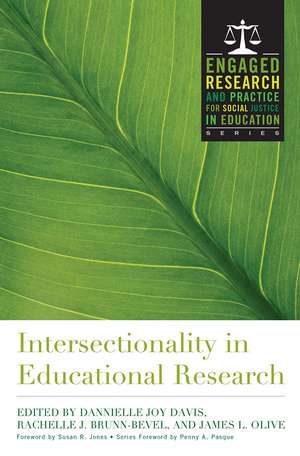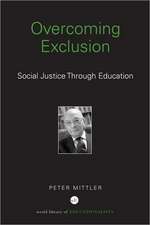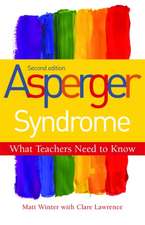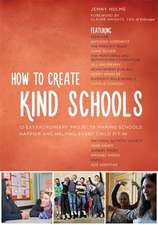Intersectionality in Educational Research
Editat de Dannielle Joy Davis, James L. Olive, Rachelle J. Brunn-Bevelen Limba Engleză Paperback – iul 2015
| Toate formatele și edițiile | Preț | Express |
|---|---|---|
| Paperback (1) | 323.58 lei 6-8 săpt. | |
| Taylor & Francis – iul 2015 | 323.58 lei 6-8 săpt. | |
| Hardback (1) | 1005.17 lei 6-8 săpt. | |
| Taylor & Francis – 8 iul 2015 | 1005.17 lei 6-8 săpt. |
Preț: 323.58 lei
Nou
Puncte Express: 485
Preț estimativ în valută:
61.93€ • 64.41$ • 51.12£
61.93€ • 64.41$ • 51.12£
Carte tipărită la comandă
Livrare economică 14-28 aprilie
Preluare comenzi: 021 569.72.76
Specificații
ISBN-13: 9781620360965
ISBN-10: 1620360969
Pagini: 330
Dimensiuni: 152 x 229 x 20 mm
Greutate: 0.47 kg
Ediția:1
Editura: Taylor & Francis
Colecția Routledge
Locul publicării:Oxford, United Kingdom
ISBN-10: 1620360969
Pagini: 330
Dimensiuni: 152 x 229 x 20 mm
Greutate: 0.47 kg
Ediția:1
Editura: Taylor & Francis
Colecția Routledge
Locul publicării:Oxford, United Kingdom
Public țintă
PostgraduateCuprins
Foreword—Susan R. Jones Series Foreword—Penny A. Pasque Introduction—Rachelle J. Brunn-Bevel, Danielle Joy Davis, and James L. Olive Part One. Intersectionality and Methodologies 1. Queering the Intersectional Lens. A Conceptual Model for the Use of Queer Theory in Intersectional Research—James L. Olive 2. A Case for Using Qualitiative Inquiry to Study Intersectionality in College Students—Annemarie Vaccaro 3. Salience at the Intersection. Latina/o Identities Across Different Campus Contexts—Adriana Ruiz Alvarado and Sylvia Hurtado Part Two. Intersectionality and K–12 Education 4. Teacher's Perspectives on Race and Racial Inequality. Strategic Intersectionality and the Countervailing Effects of Privilege—Laurie Cooper Stoll 5. Gender in Schools. Constructing Identity in High School—Sarah Prior Part Three. Intersectionality and Postsecondary Education 6. Understanding the Academic Achievement of Latina College Graduates. A Call for Intersectionality as a Methodological Framework—María Oropeza Fujimoto 7. Intersectionality of Multiple Racisms. A Case Study of Campus Climate for Three Mixed Race Undergraduate Women—Chelsea Guillermo-Wann 8. Intersectionality in and of Race. Identity Construction Re/Considered—Alina S. Wong 9. "Writing Our Own Rule Book". Exploring the Intersectionality of Gay College Men—Daniel Tillapaugh 10. Subaltern Supermen. Intersecting Masculinities and Disabilities in Popular Culture—Karen A. Myers, Jason A. Laker, and Claire Lerchen Minneman Part Four. Intersectionality and Academe 11. Interlocking Oppressions. An Intersectional Analysis of Diversity in Diversity Action Plans at U.S. Land-Grant Universities—Susan V. Iverson 12. In the "Web" of the Twenty-First Century American Academy. Reflections of a Black and an Indian Female Faculty—Namita N. Manohar and Pauline E. Bullen 13. Me-Search IS Research. My Socialization as an Academic—Tamara Bertrand Jones 14. The Experiences of Marginalized Academics and Understanding the Majority. Implications for Institutional Policy and Practice—Dannielle Joy Davis Conclusion—James L. Olive Reflective Questions Editors and Contributors Index
Notă biografică
Dannielle Joy Davis James L. Olive Rachelle J. Brunn-Bevel Susan R. Jones is professor in the higher education and student affairs program in the Department of Educational Studies at The Ohio State University.
Recenzii
"Useful for policy makers, higher education and student affairs scholars, and research methods instructors, Intersectionality in Educational Research is for 'those interested in intersectionality's theoretical contributions who are seeking practical research methods to advance certain lines of inquiry'. Further, the book is particularly functional for scholars—burgeoning and established—in search of concrete examples of intersectionality applied in the field of education. Whether assessment directors engaging in large-scale studies, doctoral candidates grappling with methodological decisions, or researchers striving to capture complexities within groups, across groups, and at the intersections of groups, this book provides clear and descriptive accounts of the methodological and theoretical processes of applying intersectionality. The text also serves as a companion to materials centered on identity development, learning theory, educational systems, organizational theory, and multiculturalism."
The Review of Higher Education
"In Intersectionality in Educational Research, Dannielle Joy Davis, Rachelle J. Brunn Bevel, and James L. Olive have brought together an impressive body of work to illustrate the power and importance of intersectionality in educational research. Drawing from the complex nature of intersectionality, the editors bring together their work in four parts: methodologies, K–12 education, postsecondary education, and academe. In each of these contexts, which almost mirror levels of an ecological system, the book presents unique challenges. The editors have assembled work highlighting both the dynamics of identity and methodological insight. The introduction is also an indispensable part of this volume. It offers a clear and concise review of the history of the term intersectionality and how it has been applied as a theoretical framework. For someone new to the field, the book provides a comprehensive introduction to the subject. For those more familiar, this collection represents a useful compendium of work indicative of the complexity in the field. As a whole, Intersectionality in Educational Research is a unique contribution and brings together a variety of research and perspectives on a term that is quickly becoming a centerpiece of discussion in identity theory and the social contexts of education.
Teachers College Record
"This collection of research articles underscores the importance of understanding the intersections between race, class, and gender for educational policy, practice, and research. The book will be a great asset for anyone working to enhance educational equity and access."
Dr. Margaret L. Andersen
University of Delaware
"This book offers a comprehensive, complex and well-organized overview of intersectionality as a tool for critical inquiry and analysis and highlights its usefulness as a theoretical perspective and a qualitative and quantitative methodology. Incorporating examples relevant to a variety of disciplines and considering educational issues that range in relevance from K-12 to higher education, this book is a must read for policy makers, researchers, educators, administrators, practitioners, advocates and others vested in understanding the intersections of social disparities such as race, class, and gender and the ways in which such intersections shape the educational experiences and outcomes of marginalized populations. Whether your knowledge of intersectionality reflects that of a novice or seasoned scholar, you will find this book enthralling and the reflective questions at the end of each chapter thought provoking."
Yvette Murphy-Erby, Associate Dean, Fulbright College of Arts and Sciences
University of Arkansas
"Intersectionality in Educational Research is an ambitious book designed to introduce readers to definitions and uses of intersectional theory in studying educational policy, practice, and theory. The editors have brought together scholars who employ intersectional theory in empirical and theoretical projects that span K-12 and higher education, students and faculty, and research approaches. This book is an ideal text for readers seeking to enter the scholarly conversation about intersectionality in education research."
Kristen Renn, Professor of Higher, Adult, and Lifelong Education (HALE) in the Department of Educational Administration
Michigan State University
The Review of Higher Education
"In Intersectionality in Educational Research, Dannielle Joy Davis, Rachelle J. Brunn Bevel, and James L. Olive have brought together an impressive body of work to illustrate the power and importance of intersectionality in educational research. Drawing from the complex nature of intersectionality, the editors bring together their work in four parts: methodologies, K–12 education, postsecondary education, and academe. In each of these contexts, which almost mirror levels of an ecological system, the book presents unique challenges. The editors have assembled work highlighting both the dynamics of identity and methodological insight. The introduction is also an indispensable part of this volume. It offers a clear and concise review of the history of the term intersectionality and how it has been applied as a theoretical framework. For someone new to the field, the book provides a comprehensive introduction to the subject. For those more familiar, this collection represents a useful compendium of work indicative of the complexity in the field. As a whole, Intersectionality in Educational Research is a unique contribution and brings together a variety of research and perspectives on a term that is quickly becoming a centerpiece of discussion in identity theory and the social contexts of education.
Teachers College Record
"This collection of research articles underscores the importance of understanding the intersections between race, class, and gender for educational policy, practice, and research. The book will be a great asset for anyone working to enhance educational equity and access."
Dr. Margaret L. Andersen
University of Delaware
"This book offers a comprehensive, complex and well-organized overview of intersectionality as a tool for critical inquiry and analysis and highlights its usefulness as a theoretical perspective and a qualitative and quantitative methodology. Incorporating examples relevant to a variety of disciplines and considering educational issues that range in relevance from K-12 to higher education, this book is a must read for policy makers, researchers, educators, administrators, practitioners, advocates and others vested in understanding the intersections of social disparities such as race, class, and gender and the ways in which such intersections shape the educational experiences and outcomes of marginalized populations. Whether your knowledge of intersectionality reflects that of a novice or seasoned scholar, you will find this book enthralling and the reflective questions at the end of each chapter thought provoking."
Yvette Murphy-Erby, Associate Dean, Fulbright College of Arts and Sciences
University of Arkansas
"Intersectionality in Educational Research is an ambitious book designed to introduce readers to definitions and uses of intersectional theory in studying educational policy, practice, and theory. The editors have brought together scholars who employ intersectional theory in empirical and theoretical projects that span K-12 and higher education, students and faculty, and research approaches. This book is an ideal text for readers seeking to enter the scholarly conversation about intersectionality in education research."
Kristen Renn, Professor of Higher, Adult, and Lifelong Education (HALE) in the Department of Educational Administration
Michigan State University
Descriere
The purpose of this work is to advance understanding of intersectional theory and its application to research in education. The scholars whose work appear in this volume utilize intersectional theory and research methods to work in fields and disciplines such as Education, Sociology, Women’s Studies and Justice Studies.













